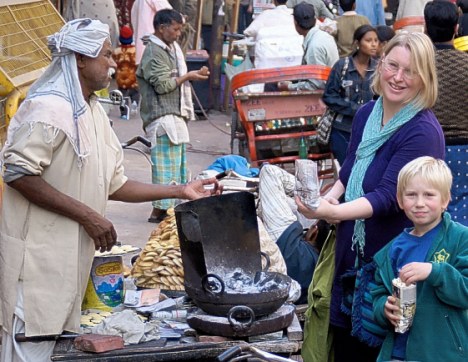Sweet potato doused in masala and lemon bought from a roadside stall; chewy rice balls with spicy sauce; syrupy jalebi sweets deep-fried before your eyes – the adventurous food on offer in the street markets of Old Delhi was one of the things we were looking forward to on our onceina-lifetime trip to India.
But there was a downside. Taking my three children, the youngest aged eight, to such an exotic location brought worries over ‘Delhi Belly’: E.coli bugs, travellers’ tummy and the other things that often afflict Western travellers in developing countries.
However, thanks to a medical breakthrough, my family have been among the first travellers who have been able to prevent such illnesses from turning a happy holiday into a miserable one.
Around half of those going to Asia, Africa and Latin America normally fall foul of bugs – usually bacterial infections in the gut from food or drink – causing diarrhoea. Up to now, the only treatment has been to prescribe antibiotics and other treatments after the damage has been done.
Now, after eight years of research at the Food Microbial Science Unit at Reading University, a ground-breaking medicine is available from High Street chemists. Called Bimuno, it is an advance on probiotic yogurt drinks that add good bacteria to the gut. It is one of the first of a new generation of dried prebiotics that actually feed and stimulate the good bacteria there already.
Based on natural substances – galacto-oligosaccharides (GOS), which are found in breast milk – the powder encourages the good bacteria to flourish, suppressing invading germs that cause food poisoning.
Its powerful action can be a boost for Western tummies used to a plain diet and can help them to acclimatise before even leaving home. The evidence shows that it is in the first two weeks of exposure to foreign food that most cases of travellers’ diarrhoea occur – the duration of many an expensive holiday and the time it often takes to get used to a very different food environment.
The first double-blind placebo-controlled trial of the drug was published recently in the wellrespected European Journal Of Clinical Nutrition. The nine-month study showed that among a group of almost 200 healthy volunteers, those who took the new supplement for a week before their holiday were half as likely to get travellers’ diarrhoea as those who were given a sugar-based fake.
The GOS group were significantly healthier with only around a fifth getting diarrhoea. The few who did succumb reported symptoms lasting for two days compared to four in the control group.
The report’s lead author Alexandra Drakoularakou, from the Reading Sciences Unit, believes the research is a major breakthrough in the condition, which affects 11million people a year. ‘Compared to the placebo, a significant number of holidaymakers on prebiotic GOS had a diarrhoea-free holiday,’ he says.
‘This is the first time any clinical trial has shown significant preventive and protective p r o p e r t i e s against travellers’ diarrhoea.’ The leader of the research team, Professor Glenn Gibson, a specialist in the field of gut microbiology, says: ‘Our clinical trials have already proven the benefits of prebiotic GOS to the immune system and to people with irritable bowel syndrome, so it’s great to now offer genuine reassurance to holidaymakers travelling abroad.’
Catherine Collins, principal dietician at St George’s Hospital, London, agrees that prebiotics are a useful aid for treating food poisoning – and far better than probiotic yogurt drinks.
‘Unlike bacterial drinks, prebiotic fibres supply the foodstuff to keep your own bacteria healthy. Gippy holiday tummy occurs when disease-causing bacteria are present in numbers sufficient to quash your own gut flora. Prebiotics provide fuel for healthy bugs, allowing them to flourish and suppress the nasty ones.’
For a week before we left for India, I sprinkled the white powder each night into my children’s cocoa.
A flavourless substance which comes in a plastic packet like a sugar stick, it is undetectable. My children, Mary, 13, Walt, 12, and William, eight, noticed me putting it in their drinks but did not complain. My husband, Rob, and I added it to our coffee each morning.
The manufacturers instruct that travellers should continue to take it while away to keep their gut flora in tip-top condition ready to fight off strange bugs. And they should not take it as encouragement to indulge in risky behaviour: they are still urged to avoid tap water, iced drinks and washed salad.
So did it work? In a word, yes. Our first few days in Delhi were spent with our friend, the food writer Pamela Timms, whose blog ‘Eat And Dust’ on fresh, delicious and unusual Indian food has won international recognition.
Nothing from her kitchen was likely to carry much risk, but we also ventured into the ancient streets of Old Delhi and ate the tasty wares of street vendors.
After a few days, Rob, who was rather sceptical about the benefits of Bimuno and skipped quite a few doses, did have a day in bed.
As he lay there groaning, the children and I – who had eaten the same food – headed off to an amusement park.
I am pleased to say none of us had any problems for the entire holiday. In fact we enjoyed the food so much that by the end, my main concern was that the waistband of my trousers was far too tight.

